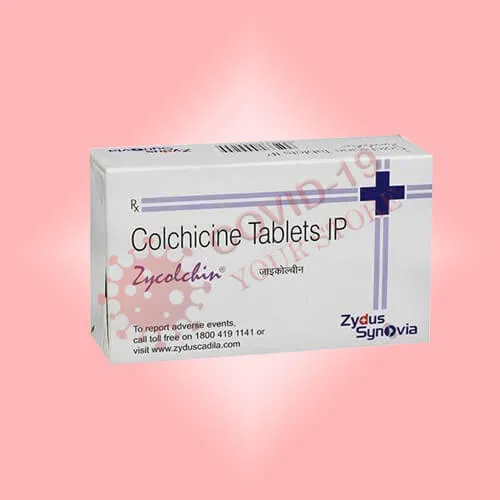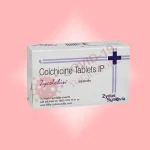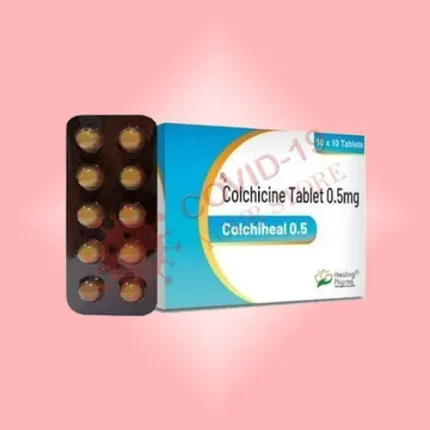What is Colchicine (Zycolchin 0.5 mg)?
Colchicine (Zycolchin 0.5 mg) is a medication commonly prescribed to treat and manage the symptoms of gout, Familial Mediterranean fever (FMF), and other inflammatory conditions. It works by reducing inflammation and decreasing pain during gout attacks by interfering with the activity of white blood cells and the inflammatory process.
Zycolchin, the brand name for Colchicine, is typically used to manage the symptoms and prevent flare-ups of gout, a type of arthritis caused by the accumulation of uric acid crystals in the joints. It is an effective treatment for managing the acute symptoms of gout, but it does not cure the condition itself.
How Does Colchicine (Zycolchin 0.5 mg) Work?
Colchicine works by inhibiting the activity of white blood cells that cause inflammation in the body. When a gout attack occurs, these white blood cells respond to uric acid crystals in the affected joints, leading to intense pain and swelling. Colchicine interrupts this process by reducing the migration and activation of these cells, thereby decreasing inflammation and pain.
It also prevents the buildup of uric acid crystals in the joints, which helps in managing the long-term complications of gout.
Benefits of Colchicine (Zycolchin 0.5 mg)
- Relieves Gout Symptoms: Colchicine is most commonly used to treat acute gout flare-ups, providing significant pain relief.
- Reduces Inflammation: It helps reduce the swelling and inflammation associated with gout attacks.
- Prevents Gout Attacks: Regular use can help prevent future gout flare-ups and reduce the frequency of attacks.
- Treats Familial Mediterranean Fever (FMF): Colchicine is effective in managing FMF, a genetic disorder causing recurrent fever and inflammation.
- Reduces Risk of Joint Damage: By preventing recurrent gout flare-ups, Colchicine may help reduce the risk of long-term joint damage and deformities caused by untreated gout.
How to Take Colchicine (Zycolchin 0.5 mg)
- Dosage: The dosage depends on your condition and how well you respond to the medication. Typically, the recommended dose for an acute gout attack is 1.2 mg initially, followed by 0.6 mg every 1 to 2 hours until symptoms subside or a total of 1.8 to 2.4 mg is reached. For chronic use, the daily dose is generally 0.5 mg to 1 mg, taken once or twice daily.
- Administration: Colchicine should be taken orally with a full glass of water. It can be taken with or without food.
- Missed Dose: If you miss a dose, take it as soon as you remember unless it is close to your next dose. Do not double up on doses.
- Adjustments: Always follow your doctor’s instructions regarding dosage adjustments based on your specific health needs.
Who Makes Colchicine (Zycolchin 0.5 mg)?
Colchicine (Zycolchin 0.5 mg) is manufactured by Zydus Cadila, a well-known pharmaceutical company that produces a wide range of medications for various medical conditions. Ensure that you obtain this medication from licensed pharmacies to guarantee its quality and authenticity.
Is Colchicine (Zycolchin 0.5 mg) Safe for Humans?
Colchicine is generally safe for most individuals when taken according to prescribed guidelines. However, it can cause serious side effects if taken incorrectly or in excess.
Precautions:
- Pregnancy and Breastfeeding: Consult your doctor if you are pregnant or breastfeeding. Colchicine should only be used during pregnancy if the potential benefit justifies the potential risk to the fetus.
- Kidney and Liver Disease: If you have liver or kidney problems, your doctor may adjust your dosage to avoid toxicity.
- Drug Interactions: Colchicine may interact with other medications, including statins, antibiotics, and anti-fungal medications. Inform your doctor of all the medications you are currently taking.
- Overdose: Taking too much Colchicine can lead to serious toxicity, with symptoms like vomiting, diarrhea, and abdominal pain. Seek immediate medical attention if an overdose is suspected.
Possible Side Effects of Colchicine (Zycolchin 0.5 mg)
While Colchicine is generally well-tolerated, it can cause side effects, including:
- Common Side Effects: Stomach upset, nausea, diarrhea, or vomiting.
- Serious Side Effects: Muscle weakness, numbness, tingling in the fingers or toes, or a rapid heart rate.
- Severe Reactions: Liver damage, kidney problems, and severe allergic reactions.
If you experience any severe side effects, such as difficulty breathing or chest pain, seek emergency medical attention.
Disclaimer
This content is provided for informational purposes only and should not replace professional medical advice. Always consult a healthcare provider before starting, stopping, or adjusting your medication. Improper use of Colchicine may result in serious side effects.








